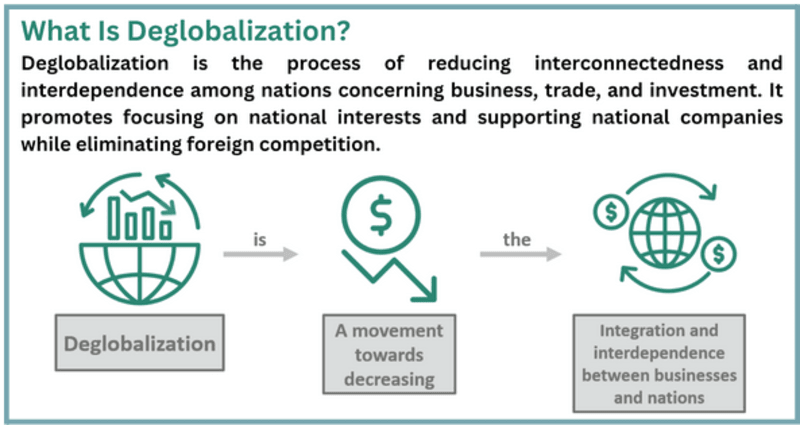A new world order taking shape
Relevance: GS III (Environment)
- Prelims: Rio Summit; World Trade Organization;
- Mains: National and International initiatives to combat Climate Change effects; De-globalization;
Why in the News?
In 2024, there is a need to rework on trade rules for a different kind of Globalization (Economic, Social, Cultural globalization, Environmental, Technological globalization).
- This is important both for the economies in the Global South and the fight against climate change.
Historical Background:
- In 1990’s:
-
- The UN Framework Convention on Climate Change was agreed at the Rio Summit. The World Trade Organization (WTO) was also set up and Global rules to facilitate free trade between nations was signed on.
-
- Significance of this step: The cost of manufacturing would come down when goods were produced in countries with lower labor costs and environmental standards. The export-economies would drive prosperity in the still-developing world, but most importantly in the rich world where consumers would benefit from cheaper goods and the boom in services.
- In 2000’s:
-
- China entered into the WTO, which had a massive workforce; no trade unions; little environmental safeguards; and an authoritarian government.
- After joining WTO, China’s share of global CO2 emissions rose from 5% in 1990 to 21% in 2019. Trade boomed but the age of global prosperity did not come, and an increased trade meant that CO2 emission increased.
Therefore, in 20 years, this idea of globalization has soured because the proponents of the grand scheme are turning their backs to the idea of unfettered (uncontrolled) global trade, which was designed to be without distortions of subsidy and support by national governments.
|
The most hyped issue is US’ position against China: This is the fight against autocratic and undemocratic regimes. However the real reason is to gain control over resources and technologies needed for the future, including the green economy that the world so desperately needs. China Factor:
|
What are the Challenges?
- De-globalization or Localization:

-
- The western world’s mission to break the stranglehold (China factor) will lead to higher costs of the green transition (due to larger emissions and high cost) and even delay it. It would also lead to securing access to rare minerals and rebuilding its manufacturing industry, despite the higher costs of labor and environmental standards.
- This could lead to de-globalisation or localisation as more countries decide to maximize their advantage as holders of natural resources, and technology and the knowledge that goes with it.
- New breakthroughs in Technology:
- It is also a possibility for new breakthroughs in the technology market, which would make the China-dominated supply chain redundant. For example, there is talk about sodium ion batteries that could take down the need for lithium batteries.
- De-globalisation could equally mean that the pace of green transition is disrupted. For instance, the US, through the IRA, is providing support to local manufacturing of electric vehicles (Chinese-made battery components will not be eligible for full subsidies).
- Given the near-complete control of China in the raw mineral and battery manufacturing segment, this disengagement may delay the electric vehicle transition or make it more expensive.
Therefore, managing the twin objectives of localization/De-globalization and a speedy green transition in today’s China-dominated world could be a challenge.
Indian Scenario:
- India too has decided to invest in local capacity for the solar industry by announcing the fiscal incentives for solar cell with module manufacture and imposed higher import duties on Chinese products.
- This may impede India’s ambitious renewable programme, as domestic production may not be able to keep pace or be cost-competitive.
- On the other hand, there is an obvious advantage in building our industry. The gradual closing of the free-trade world will also have implications for Indian industry’s exports.
Way Forward:
Finally, it goes without saying, no matter whether any country, should be continuously monitoring and addressing social and environmental issues within their supply chains. This is a new game in town and we need to see if this time around the rules of trade will work for or against the people and the Planet.
|
BEYOND EDITORIAL Significant Outcomes from the Rio Summit (1992): The Earth Summit was held in Rio de Janeiro from June 3 to 14, 1992, was a significant event with several outcomes. Some of the key achievements and outcomes of the summit include:
The Rio Summit was a pivotal event that laid the groundwork for international cooperation on environmental and sustainable development issues, leading to the development of important agreements and principles. |
Prelims PYQs
Q. With reference to 'Agenda 21', sometimes seen in the news, consider the following: (2016)
- It is a global action plan for sustainable development.
- It originated in the World Summit on Sustainable Development held in Johannesburg in 2002.
Which of the statements given above is/are correct?
(a). 1 only
(b). 2 only
(c). Both 1 and 2
(d). Neither 1 nor 2
Mains PYQs
Q. What are the key areas of reform if the WTO has to survive in the present context of ‘Trade War’, especially keeping in mind the interest of India? (2018)
Q. 'Clean energy is the order of the day.' Describe briefly India's changing policy towards climate change in various international fora in the context of geopolitics. (2022)


